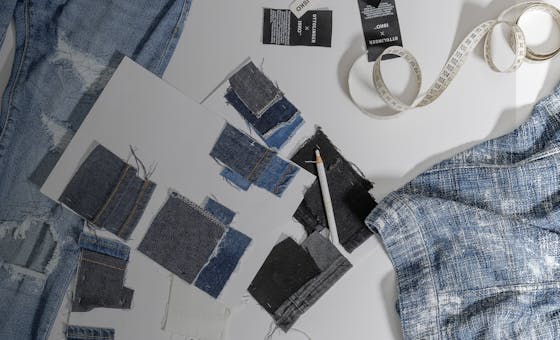BEST PRACTICE
Our Code of Business Principles guides our decisions, commitments and ethics. We know how to measure our impact, and deliver on our promises. In 2017, ISKO™ was the first denim company to receive the Nordic Swan and the EU Ecolabel certifications. With Environmental Product Declarations (EPDs) and Life Cycle Assessments (LCAs) for our +25,000 products, we have set the industry standard, and work to educate and support others to meet this standard.
BEST PRACTICE
Our Code of Business Principles guides our decisions, commitments and ethics. We know how to measure our impact, and deliver on our promises. In 2017, ISKO™ was the first denim company to receive the Nordic Swan and the EU Ecolabel certifications. With Environmental Product Declarations (EPDs) and Life Cycle Assessments (LCAs) for our +25,000 products, we have set the industry standard, and work to educate and support others to meet this standard.
OUR CERTIFICATIONS
Using certified fibres and materials ensures genuine, credible and transparent work towards sustainability in the textile industry. Most importantly, it ensures real, meaningful and measurable change.
This is accomplished through independent third-party certification. The integrity and traceability of all the materials in our patented products motivates us, and we strive to have every ingredient certified to the highest possible standard.
The EU Ecolabel is a label of environmental excellence that is awarded to products and services meeting high environmental standards throughout their life-cycle.
The Nordic SWAN Ecolabel enables consumers and professional buyers to choose the environmentally best goods and services. It evaluates a product’s total life cycle from raw material to waste/recycling.
DOWNLOAD
The GOTS is recognised as one of the leading processing standard for textiles made from organic fibers. It defines high-level environmental and toxicological criteria – on for example all input chemicals such as dyestuffs and waste water treatment – along the entire organic textiles supply chain and all processors must comply with social criteria. Only textile products that contain a minimum of 70% organic fibers can become GOTS certified.
The GRS is a holistic certification that verifies recycled input material, tracks it from input to the final product, and also ensures responsible social, environmental practices and chemical use through production. The desired effect of the GRS is to provide brands with a tool for more accurate labeling, to encourage innovation in the use of reclaimed materials, to establish more transparency in the supply chain, and to provide better information to consumers.
The RCS is a chain of custody standard that verifies recycled input material that tracks recycled raw materials through the supply chain from input to the final product. The standard was developed through work by the Materials Traceability Working Group, part of Outdoor Industry Association’s (OIA) Sustainability Working Group. The RCS uses the chain of custody requirements of the Content Claim Standard (CCS).
OCS: This scheme verifies that a product has met organic standards throughout its journey – from raw material to finished product. OCS blended is used for products that contain 5% minimum of organic material blended with conventional or synthetic raw materials.
It defines an ISO9000 Quality Management System (QMS). ISO 9001 evaluates whether your Quality Management System is appropriate and effective, while forcing you to identify and implement improvements.
ISO 14001 specifies the requirements for an environmental management system that an organization can use to enhance its environmental performance.
IS0 27001 certificate specifies the requirements for establishing, implementing, maintaining and continually improving an information security management system within the context of the organization.
ISO 50001 is a specification created for an energy management system. The standard specifies the requirements for establishing, implementing, maintaining and improving an energy management system.
A worldwide consistent, independent testing and certification system for raw, semi-finished, and finished textile products at all processing levels, as well as accessory materials used.
Spinning, texturizing, warp dyeing, weaving, fabric dyeing, printing and coating
STeP focusses on the certification of the entire production chain in the area of textile and leather. Textile manufacturers from all processing levels can be certified, from fibre manufacture to spinning and weaving/knitting to finishing and making up.
Weaving and dyeing
STeP focusses on the certification of the entire production chain in the area of textile and leather. Textile manufacturers from all processing levels can be certified, from fibre manufacture to spinning and weaving/knitting to finishing and making up.
The occupational Health and Safety Assessment Series.
Sedex is one of the world’s largest organizations for helping companies manage responsible sourcing in their supply chain.
The SA8000 Standard is the world’s leading social certification program. The SA8000 Standard and Certification System provide a framework for organizations of all types, in any industry, and in any country to conduct business in a way that is fair and decent for workers and to demonstrate their adherence to the highest social standards. The SA8000 Standard is based on internationally recognized standards of decent work, including the Universal Declaration of Human Rights, ILO conventions, and national laws. SA8000 applies a management-systems approach to social performance and emphasizes continual improvement—not checklist-style auditing.
OUR PARTNERSHIPS
We believe in transparency. We devote the time and resources needed to select the best partners to collaborate with. We are passionate about joining other industry leaders to promote and improve environmental impacts and social responsibility throughout the supply chain.
Our partners help us monitor, manage, benchmark and improve our activities and practices. We take care to choose collaborations, partners and memberships that can help us make a real difference.
Awarded only to those that meet the strict safety and environmental requirements of the bluesign® CRITERIA, using approved materials that are manufactured with a minimum impact on people and the environment.
Textile Exchange is a global non-profit that works closely with its members to drive industry transformation in preferred fibers and materials, integrity and standards and responsible supply networks. They identify and share best practices regarding farming, materials, processing, traceability and product end-of-life in order to reduce the textile industry’s impact on the world’s water, soil and air, and the human population.
The Sustainable Apparel Coalition is the apparel, footwear, and textile industry’s leading alliance for sustainable production. The SAC develops the Higg Index, a standardized supply chain measurement suite of tools for all industry participants. ISKO is a member of SAC and uses the Higg Facility Tools to measure the social and environmental performance of our facilities. These modules measure impacts at our factories. We conduct the assessments every year, which are then verified by SAC-approved, on-site assessors.
ISKO is fully committed and an active signatory member of the ZDHC Foundation’s Roadmap to Zero programme. This programme takes a holistic approach to tackling the issue of hazardous chemicals in the global textile and footwear value chain. Together with other ZDHC brands, we are engaging with diverse stakeholders to raise the awareness of industry standards and work collaboratively for change towards zero discharge of hazardous chemicals in the fashion industry. ISKO shares and manages its responsible chemicals and wastewater usage through the ZDHC platform.
Social & Labour Convergence Project (SLCP), an initiative led by the world's leading manufacturers, brands, retailers, industry groups, (inter)governmental organisations, service providers, and civil society organisations, continues to make progress towards its mission. This pioneering project has developed a simple, unified and effective industry-wide assessment framework with stakeholders efforts to improve working conditions in the global apparel and footwear supply chain.
BCI is a multi-stakeholder initiative that aims to promote measurable improvements in the environmental and social impacts of cotton production. A significant portion of our cotton is sourced through BCI.
Developed by SAC, it’s a suite of tools that enables brands, retailers, and facilities of all sizes to accurately measure and score a company or product’s sustainability performance.
Sedex is one of the world’s largest organizations for helping companies manage responsible sourcing in their supply chain.
ISKO x UN SDG
We are aligned with the UN Sustainable Development Goals (SDGs) – a powerful set of goals that govern how we operate, and guide our commitment to sustainability.
From our innovations in waste reduction to lessening our carbon footprint through material recycling, we are committed to contributing to the UN SDG’s in impactful ways – both directly and indirectly. We work hard to maximise our contribution, and will continue to monitor and align our progress and targets with the UN SDGs.

